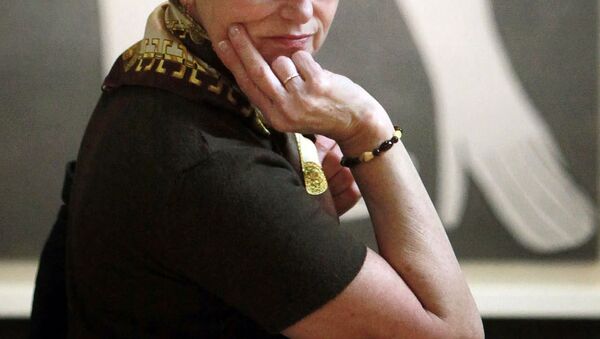Svetlana Yefimova was not among the millions of Russian women who were given flowers by their husbands on International Women's Day, a mix of St. Valentine's and Mother's Day celebrated on March 8. She divorced him in September 2010, several years after he first severely beat her, breaking her nose, and pledged to make her life "hell."
"I understood that I should save myself and my children," Yefimova, 43, a mother of two daughters, says taking a sip of coffee in a cafe in central Moscow. "It's very difficult to make this step. But if you do, there is no way back."
There are thousands of women in Russia like Yefimova, who have no place to go when they face domestic violence. There are only about 25 women's shelters across the country, with places for a total of about 200 women, according to Moscow's Anna National Center for the Prevention of Violence. That is in a country of 142 million, where every 40 minutes a woman dies at the hands of her husband or partner.
Unofficial data collected by the Anna Center show that as many as 14,000 women die annually from domestic violence in the country, around four times more per head than in the United States. Official statistics on the issue do not exist, says Russian Interior Ministry spokesman Oleg Yelnikov.
"Russian laws stipulate punishment for various offences such as hooliganism, beating, causing bodily injuries. But it is impossible to establish how many cases specifically involve domestic violence against women, among all such offences," he told RIA Novosti.
'Confidential information'
A report issued by Amnesty International in May 2010 said violence against women in the family was "widespread" in Russia, adding that "government support for crisis centers and telephone helplines remained inadequate."
The number of Russia's women shelters fell almost by half between 2006 and 2008: a total of 20 shelters, mainly run by non-government organizations, were closed in this period due to a lack of funds, the Anna Center's statistics show.
The majority of the remaining shelters are state institutions. In the past few years, many of them have turned into crisis centers providing help for "women and children in a difficult life situation," rather than for women facing domestic violence, says Anna Center's deputy head Andrei Sinelnikov. Some of the shelters, especially those located in Russian regions, face financial problems, he says.
While crisis centers are usually ready to provide psychological and legal help to women facing family problems, the issue becomes much more complicated when it comes to accommodation. Most of the crisis centers only provide accommodation to those with residential registration in the local region.
Spaseniye, the only shelter for women in the Moscow Region, is one of those centers. Albina Kovalchuk, the head of the center's dayshift, however, is reluctant to speak with journalists.
"This is confidential information. I cannot make it public," she says when asked how many women apply for accommodation in the shelter and how many can stay there simultaneously. "Why? Ask this question to a relevant ministry."
A little later, Kovalchuk explains.
"There were cases when our shelter was overwhelmed - twice as many women stayed here than the shelter's capacity allowed," she says. "But we have never denied a place for a woman who turns to us."
A short pause.
"They say they may close us. I think it would be more beneficial for the state. But too many people know about us, and it's not very easy to do this," Kovalchuk says.
There have also been discussions about a fee to be introduced for staying in the shelter, she adds. "If they do this, there will be little point in our existence."
Publicity unwanted?
Nadezhda, Moscow's only shelter for women facing domestic violence, can host up to 30 women with children simultaneously, according to the information provided by the Anna Center's deputy head.
The shelter's deputy director, Natalya Museibova, says the institution has "enough space," but admits that it lacks funds.
When asked by RIA Novosti's correspondent to visit the shelter, Museibova said a request should be first submitted to Moscow's Department for Family and Youth Policies to get permission.
A spokeswoman for the department said it may take "up to 30 days" to consider the request. She said a similar request recently submitted by another journalist was rejected, although one of the shelter's heads, Elena Korsakova, said she was unaware of such a case.
RIA Novosti correspondent's attempts to agree with the shelter's directors to visit the institution bypassing bureaucratic procedures yielded no results. "We have problems with the department," Korsakova said.
'If he beats you, this means he loves you'
Yefimova says it was her friends who helped her handle the situation in which she found herself after she failed to prove her right to stay at the Nadezhda shelter. They hosted her and her daughters at their house for several months until she found other accommodation.
A would-be politician whose career went wrong, her husband is now hiding from investigators as he faces a trial for his abuse against his former wife. Besides the broken nose, the history of their battles include an episode in which he was trying to break down the door of Yefimova's apartment with an axe, and another one, in which he seriously injured Yefimova's face last year while trying to forcibly take away their one-year-old daughter.
An ancient Russian proverb says: "If a man beats you, this means he loves you." But Yefimova is not among the many Russian women who are used to tolerating domestic violence.
"I will go until the end," she says, seeming optimistic despite all the difficulties that she has faced. "I know, this trial may last for years, but I am not going to give up."
MOSCOW, March 9 (RIA Novosti correspondent Maria Kuchma)




